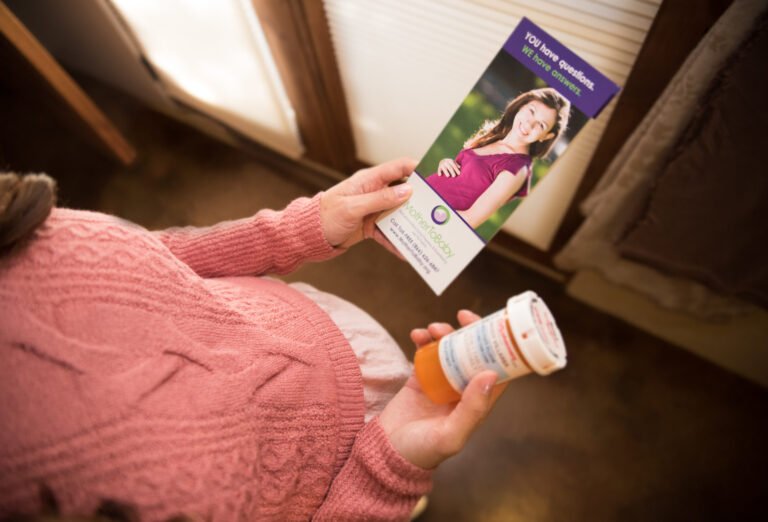By Mara Gaudette, MS, CGC, Teratogen Information Specialist, MotherToBaby California
The chat message came promptly at the morning start time. The words and exclamation points clearly emphasized concern. “I just found out I’m pregnant! Taking statin medication to lower cholesterol since 6th grade! I talked to my doctor and stopped taking it yesterday. But what damage have I already done? I know it’s a class X drug! Need information – please help!” Mae agreed to a phone call and I logged off the MotherToBaby live chat service and called Mae.
First, you may wonder why anyone would take a cholesterol-lowering drug since late elementary or high school. Isn’t that extreme? Actually no – in Mae’s case she has an inherited condition called familial hypercholesterolemia – or “FH” for short. This is a condition that occurs in about 1 in 250 people but is underdiagnosed and therefore undertreated. A simple blood test that checks your cholesterol levels and a review of your family history (such as checking for heart attacks at younger ages) can help determine if you have FH. Much less often, a more severe form of FH, inherited from both parents, can occur.
To back it up a bit, cholesterol is that fatty substance in our body that we need in some amount, but too much cholesterol increases the chance for early heart disease. Lifestyle changes that are recommended for all of us, such as regular exercise, avoiding smoking, and eating a healthy diet are also part of the treatment plan for FH (and Mae had worked hard to follow these guidelines). However, cholesterol-lowering drugs are still often a necessary part of treatment because lifestyle alone will not lower cholesterol levels enough in people with FH. For some with FH, statin drugs may be prescribed starting at age 8-10.
But what about the ‘category X’ classification that Mae mentioned – does that mean statin drugs are absolutely proven to increase birth defects? Fortunately, for Mae the answer is a resounding “no!” Many people are unaware that the FDA decided in 2014 to phase out the letter grade rating system. Although it was an easy to use system, it was not a reliable system for predicting pregnancy risk (see our January 2015 blog for more information).
So why were statins assigned this old X category? Well, the developing baby needs cholesterol to form properly, so there is a theoretical concern that cholesterol-lowering drugs could pose a pregnancy risk. Also, for many people, particularly those without FH, stopping a cholesterol-lowering drug in short-term pregnancy is considered unlikely to significantly increase heart disease risks. However, for some people, avoiding all cholesterol treatments can create concerns for both the pregnant woman and the baby. So, if you have FH, talking with your cardiologist and obstetrician about a cholesterol treatment plan is important when you’re planning a pregnancy or learning about your pregnancy.
Most studies of the class of drugs called “statins” have not found an increase in birth defects with random use in early pregnancy. This should provide some reassurance to pregnant women who were on statins before realizing they were pregnant, like Mae. (For more information, see our fact sheet on statins in pregnancy.)
“I feel a little better. But, I wish there were more pregnancies studied. We need more information about the medications we may need to take during pregnancy,” said Mae. At MotherToBaby, we totally agree! And I appreciated her guidance to introduce our optional follow-up program. I informed Mae that in addition to providing information, we have a study group that monitors pregnancy outcomes. This will allow us to provide more information to concerned parents and their healthcare providers. So if you find yourself like Mae drawn to the importance of this information and wondering how you can contribute, call 877-311-8972, email mothertobaby@ucsd.edu or you can volunteer for a study through our website . There is no cost to participate and pregnant women are never required to take medication.
Mara Gaudette is a genetic counselor and received her master’s degree from Northwestern University. Satisfied with providing immediate reassurance to worried women, she began educating the public about teratogens at her MotherToBaby affiliate in Illinois more than a decade ago. Today, she not only continues to advise MotherToBaby by phone, but also via live chat and email as a member of the MotherToBaby California team of experts.
MotherToBaby is a service of OTIS, a recommended resource by many agencies, including the Centers for Disease Control and Prevention (CDC). If you have questions about exposures like cholesterol medication, call MotherToBaby TOLL FREE at 866-626-6847 or try MotherToBaby’s text information service by sending questions to (855) 999-3525. You can also visit MotherToBaby.org to browse a library of fact sheets about dozens of viruses, drugs, vaccines, alcohol, diseases or other exposures during pregnancy and breastfeeding.
